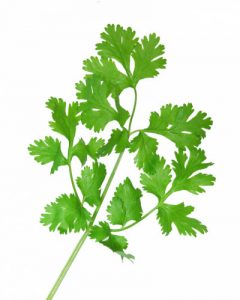Parsley is widely used as an herb, spice or vegetable in European, American, and Middle Eastern cooking. Still, many people are not aware of the valuable nutritional properties of this amazing plant. Moreover, leaf and root parsley have their own benefits and are used for cooking and as treatments.
The benefits of parsley in your nutrition
Root Parsley
While leaf parsley is often used in British and American cuisine, such is not the case for the root. However, it is common in Central and Eastern European cooking, where it is used in soups and stews. Sadly, boiled root parsley is losing at least a half of its vitamins (C, E and B complex). The good news is that the vitamins that remain in root parsley after boiling are assimilated by the organism more easily. Nutritionists recommend consuming raw root parsley as juice or in salads. Here are a few benefits of root parsley:
Fights against cancer: Root parsley contains two substances (falcarinol and falcarindiol) that have anti-cancer properties and reduce the negative effects of chemotherapy. Recommended treatment: 100 ml root parsley juice mixed with 500 ml carrot juice, consumed daily for three months.
Natural allergy relief: Due to its anti-inflammatory properties, parsley acts as an antihistamine and quells common allergy symptoms such as skin itchiness and runny noses. Recommended treatment: 50 ml of root parsley juice, mixed with 400 ml of carrot juice, consumed every day for 2-4 weeks.
Helps you get fit: Mash a parsley root and boil it for 8-10 minutes in 1 cup of water (decoction). Drink this beverage daily, 10 minutes before each meal. It will lower your appetite, regulate your digestion and eliminate excess water.
Get stronger bones: Eating root parsley salad five times a week will provide a solid dose of calcium and increase the secretion of estrogen hormones, which are responsible for calcium assimilation into the bones. Root parsley also contains iron and vitamin C which significantly improves iron absorption.
Alleviates dysmenorrhea (menstrual pain): Drink 30-50 ml of root parsley juice daily. It also helps regulate menstruation and treats amenorrhoea (lack of menstrual cycle) you can drink up to 100 ml of root parsley juice daily for one month.
Lowers blood pressure: Hypertensive patients can lower their blood pressure by drinking root parsley juice as the plant has a diuretic effect, contains potassium which regulates the heart rate and it’s flavor has positive effects on the central nervous system.
Cough remedy: Drink 50-100 ml root parsley juice daily for its antibacterial and expectorant effects. For productive cough, you should also gargle with root parsley decoction 3-4 times a day.
Leaf Parsley
Leaf parsley boasts 4 times more vitamin C than an orange (240mg/100g), has more protein than two eggs, and contains a significant amount of iron that is very well assimilated by the body in the presence of vitamin C. Also, calcium, beta carotene, vitamin B12, chlorophyll and folic acid are at high levels in leaf parsley. Therefore, here’s what it can do for your health:
Detoxifies your body: Leaf parsley can cleanse your body of toxins, addiction effects (alcohol and smoking), and kidney sand. Because parsley improves digestion, it allows you body to eliminate toxins faster and the enzymes that it contains act as a natural, mild laxative.
Boosts immunity and the nervous system: Leaf parsley is rich in vitamin C, B12 and beta-carotene.
Regulates menstruation and hormonal secretions: Parsley stimulates estrogen production and balances the uterine blood flow. Apiol, an estrogen component found in parsley, treats irregular menstruation cycles. The herb can also bring substantial contributions to increase fertility and potency.
Natural scalp tonic: Due to the richness of vitamins and nutrients, leaf parsley is an excellent treatment to prevent hair loss and stimulate hair growth: Gently rub parsley leafs on your scalp every time before washing your hair. You will see the benefits very soon.
Helps cure conjunctivitis: You can use it externally as a cool compress or drink leaf parsley juice combined with carrot juice to speed up the recovery. Due to its high vitamin A levels, leaf parsley juice improves night vision.
Alleviates pain and itching caused by insect bites: Leaf parsley is capable of neutralizing the poison of some insects, thus it can diminish the burns, stings and itching related with insect bites. All you have to do is crush some parsley leaves and rub them on the bite.
Using parsley in cooking


While parsley can be used as a treatment, you can use it as an herb if you don’t have any specific health issues. Its fresh flavor suits many foods, from soups and broths to stews and salads. The best way to consume parsley is raw, so try not to boil it or fry it. Just sprinkle it on top when the food is ready.
Precautions
Even though parsley is such a versatile herb and it can be used for a wide range of health issues, there are some situations when it is not recommended to consume it.
Pregnant women should not ingest a high amount of parsley (in other words, more than would be used to spice up the food) as it can act as an uterotonic (agent which can induce contractions to the uterus). Lactating women should also be aware that consuming a high amount of parsley reduces lactation.
Even if you are healthy, you should know that too much parsley can cause health problems of the nervous and digestive systems. As a result, the maximum recommended quantity of parsley juice is 200 ml/day for adults and 60 ml/day for children. Parsley also interacts with certain drugs such as Warfarin and diuretic pills so if you are on any medication, it is best to consult your physician before going on a parsley treatment.



